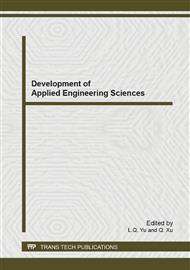p.87
p.91
p.95
p.99
p.103
p.107
p.111
p.117
p.125
Liquid-Solid Hydrocyclone Numerical Simulation and Separation Efficiency Analysis
Abstract:
This paper analyses the basic structure and the separation theory of hydrocyclone. Three-dimension spiral flow theory and CFD method was used to simulate the Φ75mm hydrocyclone. The paper focuses on researching the separation efficiency influenced by different inlet velocities, volume fraction values and the particle diameters. Besides, the influence of the thickness of overflow pipe is also considered. Results of numerical simulation shows that with the inlet velocity range from 1 to 5m/s and the particle diameters range from 2 to 5um, the hydrocyclone separation efficiency is increasing. As the volume fraction value increased from 1% to 15%, the separation efficiency descended. Increasing the thickness of overflow pipe can reduce the turbulent kinetic energy of hydrocyclone, which can make the inner flow field more stable and enhance the separation efficiency.
Info:
Periodical:
Pages:
103-106
DOI:
Citation:
Online since:
October 2014
Authors:
Price:
Сopyright:
© 2014 Trans Tech Publications Ltd. All Rights Reserved
Share:
Citation:


